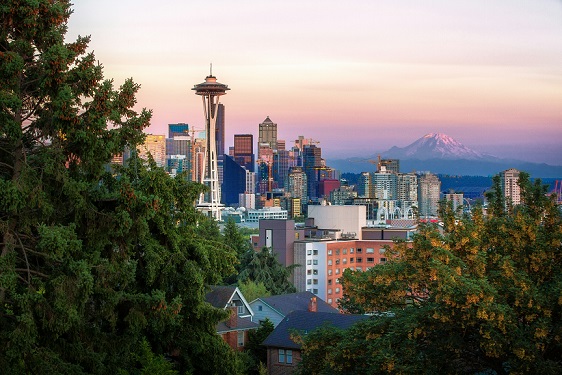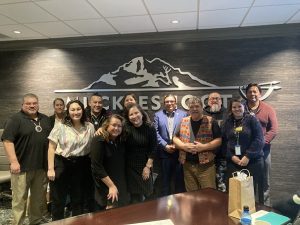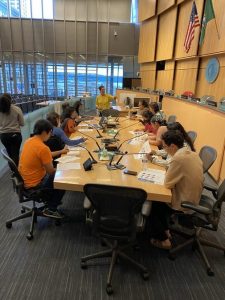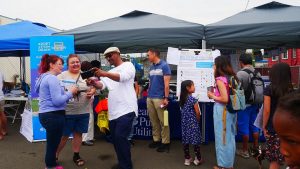2024 All-America City – Seattle, WA
Like many big cities, Seattle enjoys ample visibility and fame. Yet for residents, Seattle is less a big city and more a collective of neighborhoods and cultural communities. Since 1994, city leaders and residents have embraced a growth strategy modeled on urban villages. This strategy concentrates new housing and jobs in compact, walkable mixed-use areas along major transportation arteries, aiming to protect Seattle’s human scale, history, aesthetics, natural environment, and sense of community amidst growth and change.

However, with a growth rate of 21.1%, limitations and unintended consequences of this growth strategy have surfaced. In fact, there is concern that this approach, developed to respect the community, has reinforced a historical pattern of segregation and exclusion through economic and physical displacement.
To address these challenges, along with climate change and the pandemic, Seattle is developing the One Seattle Comprehensive Plan, emphasizing broad and deep community engagement to empower underrepresented voices in policy processes.
Tribal & Urban Native Representation and Political Engagement
The City of Seattle is home to a diverse and thriving community of roughly 46,000 American Indian, Alaska Native, and Native Hawaiian people from Indigenous communities nationwide. Tribal Nations and Tribal beneficiaries often hold a unique political status and corresponding special relationship intended to provide for the health and well-being of the Tribal Nations. Yet, their efforts have been chronically underfunded, contributing to disproportionately high incidences of disease, comorbidity, and mortality.
 Tribal Nations and urban Native communities have sought to address these challenges through legal action, collective advocacy, and social change movements that call on the government to uphold trust and treaty obligations, engage Tribal Nations as governmental partners, and advance the health and well-being of all residents. In 2021, in response to steadfast advocacy by Tribal and urban Native leaders, the City of Seattle created and funded an Indigenous Advisory Council (IAC) to advise on policies, budgets, programs, services, and projects directly affecting Indigenous populations.
Tribal Nations and urban Native communities have sought to address these challenges through legal action, collective advocacy, and social change movements that call on the government to uphold trust and treaty obligations, engage Tribal Nations as governmental partners, and advance the health and well-being of all residents. In 2021, in response to steadfast advocacy by Tribal and urban Native leaders, the City of Seattle created and funded an Indigenous Advisory Council (IAC) to advise on policies, budgets, programs, services, and projects directly affecting Indigenous populations.
Comprising nine compensated members nominated by tribal councils and urban Indian organizations, the IAC includes Indigenous youth and elders. Its effectiveness is demonstrated by its collaborations with city offices and departments and the hosting of a public civic dialogue to explore how Native cultures and values can inform public transit planning.
Additionally, the city convened its first Tribal Nations Summit in 2023 to discuss priority areas such as housing, natural resources, and public safety. The Summit resulted in city commitments to 23 initial actions that better uphold the sovereignty and treaty rights of Tribes, build regional partnerships, and improve outcomes for Native residents.
People’s Academy for Community Engagement (PACE)
 Seattle prides itself on its civic engagement, with a high level of community involvement demonstrated by high levels of volunteerism and civic participation. At the same time, a participatory culture does not equal access to decision-makers and understanding of civic engagement. To address this, the People’s Academy for Community Engagement (PACE) program was launched over a decade ago, offering leadership development for emerging community leaders. While initially successful, PACE began to lose participants from historically underrepresented communities and faced criticism for its lack of cultural relevance and specific advocacy skills.
Seattle prides itself on its civic engagement, with a high level of community involvement demonstrated by high levels of volunteerism and civic participation. At the same time, a participatory culture does not equal access to decision-makers and understanding of civic engagement. To address this, the People’s Academy for Community Engagement (PACE) program was launched over a decade ago, offering leadership development for emerging community leaders. While initially successful, PACE began to lose participants from historically underrepresented communities and faced criticism for its lack of cultural relevance and specific advocacy skills.
In response, PACE has evolved into a more responsive civic education program, partnering with community-based organizations (CBOs) to tailor the curriculum to the needs of Native, Black, Latinx, and API communities. These partnerships have enabled PACE to address topics like power dynamics, generational wealth, environmental justice, city grants, and the city’s budget in culturally relevant ways. The program has seen significant interest, with a rise in applications and completion rates.
PACE alumni have gone on to serve in various capacities, including on boards, commissions, and within city departments, showcasing the program’s impact. Additionally, PACE has facilitated community actions, such as disaster preparedness simulations and empowerment initiatives for Urban Native participants.
Overall, PACE has shifted from a traditional civics training program to a community capacity-building tool, emphasizing relationship-building, shared vision, and collective power.
Co-Designing Community-Centered Utility
Seattle Public Utilities (SPU) relies on highly skilled engineers to provide essential services like clean drinking water, stormwater management, and waste collection. Historically, community outreach, especially to underserved groups, lacked depth and was often perfunctory.
 In 2018, SPU signaled a cultural shift when it announced its aspirational vision to be a Community-Centered, One Water, Zero Waste utility. To support and drive this change, SPU developed its 2021-2026 Strategic Business Plan (SBP) through a comprehensive and collaborative process. SPU reviewed customer feedback studies and gathered input from review panels and employees through workshops, focus groups, and online surveys. Additionally, the public engagement plan included in-depth interviews with 52 community and business leaders, the distribution of a short survey, and outreach at community and cultural events in multiple languages.
In 2018, SPU signaled a cultural shift when it announced its aspirational vision to be a Community-Centered, One Water, Zero Waste utility. To support and drive this change, SPU developed its 2021-2026 Strategic Business Plan (SBP) through a comprehensive and collaborative process. SPU reviewed customer feedback studies and gathered input from review panels and employees through workshops, focus groups, and online surveys. Additionally, the public engagement plan included in-depth interviews with 52 community and business leaders, the distribution of a short survey, and outreach at community and cultural events in multiple languages.
For the SBP Update in 2024, SPU collaborated with Community Liaisons (CLs) from the Department of Neighborhoods to co-design engagement strategies, resulting in increased responses from non-English speakers and more diverse outreach. The CLs brought cultural insights and practical engagement ideas, leading to innovative tools like emoji-based surveys and interactive posters.
Following the adoption of the SBP, South Park, a predominantly BIPOC neighborhood, experienced severe flooding. SPU responded with Community Liaisons providing support in multiple languages and coordinating relief efforts with community-based organizations. While infrastructure repairs are ongoing, SPU recognizes the importance of community preparedness and is collaborating across city departments to develop climate justice initiatives.
Some Related Posts
Thank You to Our Key Partners



